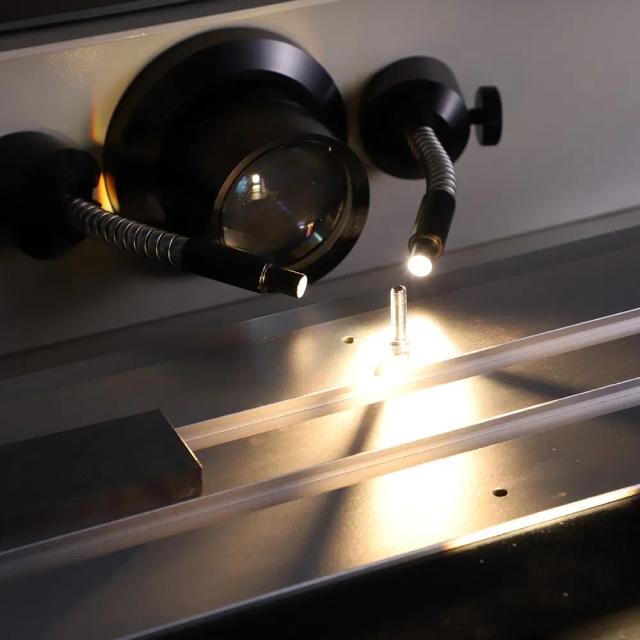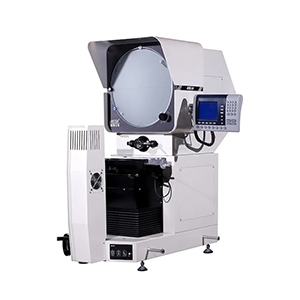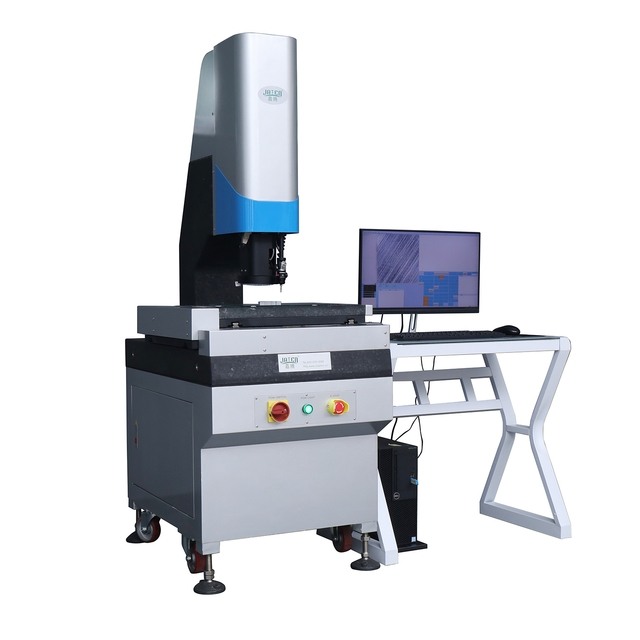
The True Role of Optical Magnification in Profile Projector Measurements
—Insights from the Optical Principles of JATEN Profile Projectors
 Jaten
Jaten
The Impact of Optical Magnification on Measurement Uncertainty in Video Measuring Machines Magnification Is Not Just Visual; It’s a Measurement Basis
In optical measuring systems, magnification is often misunderstood as simply “making the image look bigger.” In practice, whether it is a Video Measuring Machine or a visual measuring system, the key factor affecting measurement results is how the optical system maps the physical geometry of a workpiece onto the image sensor for sampling, not the display size. A video measuring machine or any optical measuring device derives measurement capability from proper imaging and sampling conditions, rather than visual appearance. Even if the image is digitally zoomed on the display, measurement uncertainty will not improve if the optical sampling conditions are insufficient. High-end VMMs are therefore designed with optical magnification as a core parameter.
 Jaten
Jaten
Analysis of the Impact of Mechanical Structure on the Long-Term Stability of Video Measuring Machines
In the field of precision dimensional inspection, a Video Measuring Machine (VMM), as a typical non-contact optical measuring device, relies not only on its optical system and measurement software, but also heavily on the long-term stability of its mechanical structure. In practical applications, even when Video Measuring Machines share identical optical configurations and measurement principles, noticeable differences in measurement consistency and repeatability can still appear after years of continuous use. Such differences are rarely caused by short-term calibration issues, but rather by the cumulative effects of mechanical structural behavior over time.
 Jaten
Jaten
Design and Engineering Practice of Multi-Angle Illumination in Optical Measuring Machines
In optical measuring machines, the illumination system is not a mere "auxiliary configuration"; it is a core factor that determines measurement stability and repeatability. Even when optical components and measurement software are identical, simply changing the illumination method can lead to significant differences in results. Therefore, understanding the principles of multi-angle illumination from an engineering perspective is essential to ensure measurement accuracy.
 Jaten
Jaten
Analysis of Flatness Error Formation in Profile Projector Stages
As a precision optical measuring instrument, the profile projector relies heavily on its metal stage, which serves multiple core functions including workpiece support, optical reference alignment, guide rail support and overall measurement stability. Even extremely small variations in the flatness of the stage are magnified significantly through the optical system, ultimately appearing as contour displacement or dimensional error. Understanding the mechanisms behind stage flatness errors is therefore fundamental to improving measurement stability and long-term reliability. The following provides an engineering-oriented systematic analysis of the major sources of flatness error in metal stages.
 Jaten
Jaten
Role of Calibration Artifacts in Video Measuring Systems and Their Impact on System Accuracy
In Video Measuring Systems (VMS), calibration artifacts are essential for establishing measurement accuracy and maintaining system stability. Whether using glass scales, grating scales, target plates, or other geometric standards, their role is to provide reliable dimensional references and correct or verify measurement errors. Based on industry practice, the main functions of calibration artifacts in VMS are described below.
 Jaten
Jaten
Glass Scale vs. Grating Scale: Application Differences in Video Measuring Systems
In Video Measuring Systems (VMS), the selection and usage of calibration standards directly affect measurement accuracy and long-term stability. Glass scales and grating scales are two commonly used calibration elements. Although both establish length references and correct system errors, they differ significantly in structure, working principle, application scenarios, and maintenance requirements. This article analyzes these differences in detail, covering technical features, applications, calibration content, maintenance, and typical use cases.
 Jaten
Jaten
Brazil & Mexico Clients Visit Factory to Explore Optical Measuring Equipment
This week, we welcomed clients from Brazil and Mexico, who visited our factory primarily to gain a deeper understanding of our optical measuring equipment. The visit provided a direct opportunity for the clients to observe production processes, technical details, and product applications.
 Jaten
Jaten
Key Role and Design Considerations of Optical Imaging Systems in Profile Projectors
Profile projectors are essential tools for industrial measurement and part inspection. Their accuracy and performance heavily depend on the optical imaging system. The optical system not only projects the contours of a workpiece onto the screen but also directly affects image clarity, measurement stability, and operational efficiency.
 Jaten
Jaten
